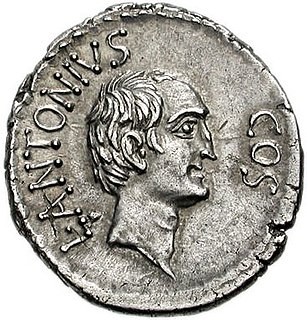Year 48 BC was a year of the pre-Julian Roman calendar. At the time, it was known as the Year of the Consulship of Caesar and Vatia. The denomination 48 BC for this year has been used since the early medieval period, when the Anno Domini calendar era became the prevalent method in Europe for naming years.

Year 44 BC was either a common year starting on Sunday, Common year starting on Monday, leap year starting on Friday, or leap year starting on Saturday. and a common year starting on Sunday of the Proleptic Julian calendar. At the time, it was known as the Year of the Consulship of Julius Caesar V and Marc Antony. The denomination 44 BC for this year has been used since the early medieval period, when the Anno Domini calendar era became the prevalent method in Europe for naming years.
This article concerns the period 139 BC – 130 BC.
Year 78 BC was a year of the pre-Julian Roman calendar. At the time it was known as the Year of the Consulship of Lepidus and Catulus. Later and less frequently, it was known as the year 676 AUC). The denomination 78 BC for this year has been used since the early medieval period, when the Anno Domini calendar era became the prevalent method in Europe for naming years.
Year 74 BC was a year of the pre-Julian Roman calendar. At the time it was known as the Year of the Consulship of Lucullus and Cotta. The denomination 74 BC for this year has been used since the early medieval period, when the Anno Domini calendar era became the prevalent method in Europe for naming years.
Year 134 BC was a year of the pre-Julian Roman calendar. At the time it was known as the Year of the Consulship of Aemilianus and Flaccus and the First Year of Yuanguang. The denomination 134 BC for this year has been used since the early medieval period, when the Anno Domini calendar era became the prevalent method in Europe for naming years.
Year 41 BC was either a common year starting on Wednesday or Thursday or a leap year starting on Tuesday, Wednesday or Thursday of the Julian calendar and a leap year starting on Wednesday of the Proleptic Julian calendar. At the time, it was known as the Year of the Consulship of Antonius and Vatia. The denomination 41 BC for this year has been used since the early medieval period, when the Anno Domini calendar era became the prevalent method in Europe for naming years.
Year 130 BC was a year of the pre-Julian Roman calendar. At the time it was known as the Year of the Consulship of Lentulus/Pulcher and Perperna and the Fifth Year of Yuanguang. The denomination 130 BC for this year has been used since the early medieval period, when the Anno Domini calendar era became the prevalent method in Europe for naming years.

The princeps senatus was the first member by precedence of the Roman Senate. Although officially out of the cursus honorum and possessing no imperium, this office conferred prestige on the senator holding it.

Lucius Antonius was the younger brother and supporter of Mark Antony, a Roman politician. He was nicknamed Pietas as a young man.
Quintus Caecilius Metellus Macedonicus was a statesman and general of the Roman Republic during the second century BC. He was praetor in 148 BC, consul in 143 BC, the Proconsul of Hispania Citerior in 142 BC and censor in 131 BC. He got his agnomen, Macedonicus, for his victory over the Macedonians in the Fourth Macedonian War.
Gaius Manilius was a Roman tribune of the plebs in 66 BCE. He is primarily known for his Lex Manilia, the bill which gave Pompey the Great command of the war against Mithridates.
Publius Servilius Vatia Isauricus, was a Roman politician and general of the First Century BC. He was elected one of the two consuls for 79 BC. From 78 to 74 BC, as proconsul of Cilicia, he fought against the Cilician Pirates and Isaurian hill tribes in Asia Minor. He was granted the agnomen Isauricus for his victories over the Isaurian hill tribes. Upon returning to Rome he celebrated a triumph for his victories.
The lex Manilia was a Roman law passed in 66 BC granting Pompey the military command in the East against Mithridates VI of Pontus.
Quintus Marcius Rex was a consul of the Roman Republic.
Publius Servilius Vatia Isauricus was a Roman consul elected in 48 BC along with Julius Caesar. He is generally regarded as a puppet of Caesar, having a long friendship with the Dictator.

Gaius Servilius Vatia was a politician of the Roman Republic in the second half of the 2nd century BC.
The gens Servilia was a patrician family at ancient Rome. The gens was celebrated during the early ages of the Republic, and the names of few gentes appear more frequently at this period in the consular Fasti. It continued to produce men of influence in the state down to the latest times of the Republic, and even in the imperial period. The first member of the gens who obtained the consulship was Publius Servilius Priscus Structus in 495 BC, and the last of the name who appears in the consular Fasti is Quintus Servilius Silanus, in AD 189, thus occupying a prominent position in the Roman state for nearly seven hundred years.
Quintus Antonius Isauricus was a Roman Legate, who commanded the 6th Legion in Britain during the AD 130s under Hadrian. He is attested as later serving as suffect consul in May 140 under Antoninus Pius with Lucius Aurelius Flaccus as his colleague.
This page is based on this
Wikipedia article Text is available under the
CC BY-SA 4.0 license; additional terms may apply.
Images, videos and audio are available under their respective licenses.



